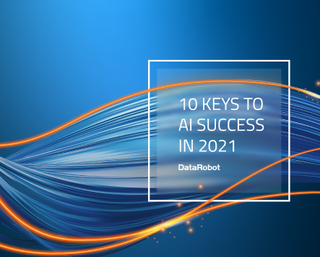Four business benefits of AI-powered analytics
How augmented analytics is revolutionising our systems

From autonomous vehicles to Amazon’s Alexa, the robots of sci-fi are becoming very real. Artificial intelligence (AI) is getting sophisticated, and it has the potential to really transform society. But while the possibilities for artificial intelligence to change our lives seem endless, many of AI’s most impressive applications are still a long way off.
However, the application of AI in analytics is already here, and it’s playing a huge role in our approach to and use of data.
This field is called ‘augmented analytics’, and it’s set to completely disrupt business intelligence (BI). It offers the ability to crunch more data than ever before, which means the vast amounts of data collected by organisations can be of much more use to them – whether that’s gleaning insights about customers to build better customer experiences or providing the basis of machine learning to help automate tasks and boost efficiency.
So how could it help to revolutionise your business systems?
Delivering insights from big data
In the internet age, data is generated at rates faster than we could ever possibly hope to keep up with manually – a reported 2.5 quintillion bytes (that’s 2.5 followed by 17 zeros) a day. Without augmented analytics, we could never hope to make the most of this data, and much that could be valuable would go ignored and be wasted.
AI has the capacity to analyse enormous amounts of data quickly and efficiently, drawing out patterns, trends and anomalies that would likely remain undiscovered otherwise. Working from these insights, we are able to gain a better understanding of the operations of our businesses and to devise better systems and working practices.
Thanks to AI, increasing amounts of data can become a boon to a business rather than a drain on resources or a lost opportunity.
Get the ITPro. daily newsletter
Receive our latest news, industry updates, featured resources and more. Sign up today to receive our FREE report on AI cyber crime & security - newly updated for 2024.
Automation
Not only does AI help with sifting through the data, but it can also automate otherwise time-consuming processes, cutting out many of the steps that formerly had to be performed manually and alerting us only to things that truly require our attention.
Data analytics systems can be automated to take out fiddly steps like cleaning and preparing data, running data comparisons and resolving customer queries, speeding up operations by fulfilling tasks that might once have taken days, weeks, months or even years.
Machine learning also allows analytics tools to come to recognise patterns of activity, so that it can differentiate genuinely anomalous events from ones that a human being would instantly understand as normal occurrences that affect operations intermittently – like a bank holiday or Black Friday, for instance. This way, only the truly relevant anomalies will be flagged as emergencies that require a rapid, human response.
Boosting efficiency
Organisations are able to use AI-generated data insights to iron out inefficiencies and design the best systems for quick, cost-effective results. For example, supermarkets can use AI to improve online-shopping systems by inputting the data and devising the most efficient ways of collecting products that don’t have their staff walking round in circles for hours. Next, it can help plan the best ways of packing vans and the optimum routes to take, saving on time, resources and energy for the most productive results.
Machine learning algorithms can predict changes that might impact business systems, as well as flag sudden changes in circumstances – in both cases helping organisations to react quickly and effectively and so experience the minimum of disruption.
Customer service
AI-powered analytics can be applied to customer interactions in terms of both automation and designing an optimum experience.
For most organisations, the majority of customer interactions can be automated by AI, allowing for a smoother and more reliable experience. Chatbots powered by natural language processing can respond to many of the more common customer questions, filtering to staff members only more specific queries that require human expertise and understanding.
By charting users’ journeys through a company’s systems, augmented analytics can help devise better experiences based on their behaviour and the preferences they display – potentially boosting sales and other successful outcomes along the way.
The application of AI-powered analytics is only in its infancy. As the new BI culture continues to take hold, the value of the speed- and efficiency-boosting technology will only grow.





